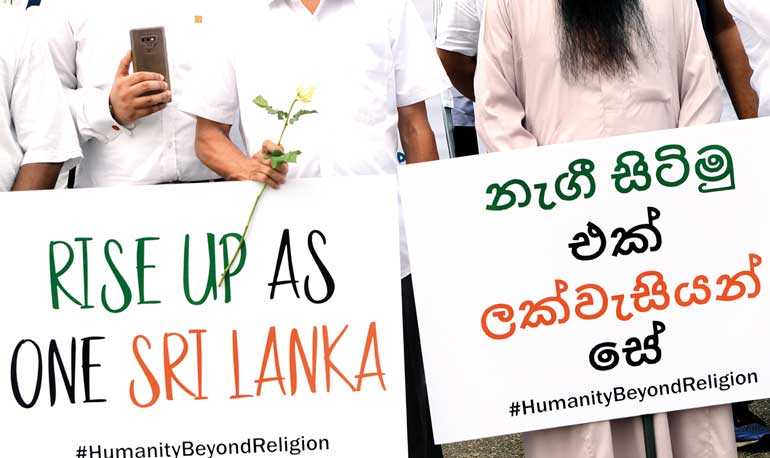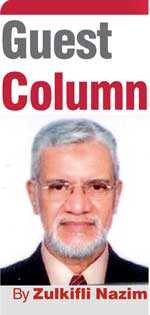Saturday Feb 21, 2026
Saturday Feb 21, 2026
Thursday, 2 January 2020 01:30 - - {{hitsCtrl.values.hits}}

Although it has been said that religion has been a divisive force in society, peaceful co-existence has always been the way of life in Sri Lanka – Pic by Shehan Gunasekara
Excerpts from the wisdom of the ancient:
The Constitution of the Five Nations – or – The Iroquois Book of the Great Law. Known as the Great Law of Peace. This law of the Iroquois, guides us to make community decisions that will serve those who will be born seven generations into the future.
“Article 24 of The Great Law of Peace stated: The chiefs of the League of Five Nations shall be mentors of the people for all time. …they shall be proof against anger, offensive action, and criticism. Their hearts shall be full of peace and good will, and their minds filled with a yearning for the welfare of the people of the League. With endless patience, they shall carry out their duty. Their firmness shall be tempered with a tenderness for their people. Neither anger nor fury shall find lodging in their minds and all their words and actions shall be marked by calm deliberation.” – Akwesasne Notes, 1977 – [Akwesasne Notes was a newspaper published by the Mohawk Nation at Akwesasne, whose lands are on both sides of the border between New York and Canada.]
You will have to keep in mind that this wisdom of the ancient survives after some 500 or 600 years, and was originated by people that the white-man mistakenly considered as “savages”. Some sources place the origin of the Five Nation Confederacy as early as 1390 AD; it was well before any possible contamination by European invaders. Early explorers and colonists found the Iroquois well established, as they had been for many generations: with a democratic government. 
[This version was prepared by Arthur C. Parker, Archaeologist of the State Museum in New York in 1915, and published by the University of the State of New York as Bulletin 184 on 1 April 1916.]
In today’s highly diverse set up in a country, the ability to work with people having diverse values and cultures is extremely important. Citizens need to feel included – that their values are being recognised, understood and respected. They need to feel that their ideas and concerns are being heard. Those conditions create strong motivation and momentum for strong satisfaction and performance in the development and progress of a country.
It can be a major challenge to work with people and cultures where others have values, beliefs and certain conventions that are distinctly different. These differences can lead to increased resistance to leadership and change because others might not understand and trust you.
In the domestic setting as well as at the international level religious freedom has always been one of the most contentious of fundamental liberties. We live in a world today where religious diversity is a reality that many contemporary societies are forced to deal with. When multiple religious views exist side by side, differences are bound to occur and it can be the root causes of disharmony. One of the root causes of disharmony is discrimination as well as marginalisation in its many forms and facets.
Although it has been said that religion has been a divisive force in society, peaceful co-existence has always been the way of life in Sri Lanka. But the reality is that ethnic and religious diversity brings obvious challenges and inherent difficulties.
We see them succumbing to their emotional impulses as a moral failing. We see a lack of self-control as a sign of a deficient character.
Although there has been religious harmony and tolerance for a very long time, a number of controversial issues have emerged which undermined religious ties between the different religious groups during recent years and raises difficult practical issues and challenge of legal pluralism. Over the years, the country has seen incidents of intolerance.
It is against this background that the following questions are always being asked: How can a society effectively accommodate multiple and sometimes competing worldviews within its midst, while at the same time upholding social cohesion and harmony?
Is it possible to allow religious groups the complete freedom to reaffirm their identity and practice their diverse rituals and traditions, without leading to resentment and conflict within the society?
To what extent is the religious freedom of minorities protected in multi-religious societies?
These are some of the challenges confronting a multi-faith democracy. At the heart of this is the need in a democratic society to reconcile the interests and respect the beliefs of the population as a whole. Balancing the diverse interests in such a multi-faith democracy can be enormously challenging. And so one of the biggest challenges facing multi-societies is how to deal with diversity.
We have all witnessed the practical difficulties of living together in our societies. How should we react to certain situations?
We all know that it is the State’s duty to strike a fair balance between the different rights and interests at stake, and when we talk about the State’s responsibility in ensuring peaceful coexistence, we are, of course, talking about a wide range of actors: not only judicial bodies, parliaments and national governments but also, and sometimes especially, regional and local authorities.
The need to respect diversity without creating divisions in society and the need to “live together” while respecting a common set of rules, which constitute a sort of “societal public order and today the need to reconsider what equality means, takes precedence as the most fundamental asset to community building, to personal growth, and to the very survival of our planet. People don’t make decisions based on truth or facts.
There is a saying that, “If you love someone do not expect anything in return; otherwise it’s not truly love. You respect someone without expecting anything in return; otherwise you don’t truly respect him. You must speak honestly without expecting a pat on the back or a high-five or a gold star next to your name; otherwise you aren’t truly being honest.”
The veracity of such quotes are veritable, transfinite.
At the heart of many faiths, practices, and cultures, advancing peaceful co-existence is essential to ensuring productive, meaningful lives and sustainable societies. On an individual level, peace may start with having calmness within oneself. Expanding outward, peace entails agreement and harmony among people.
Peace underlies our quality of life and the fabric of our communities; and, as our weaponry becomes ever more powerful, our very survival as people on this planet depends upon it.
Many spiritual traditions and teachings throughout history have emphasised peace, both as an inner journey and as an outward commitment to live in mutual benefit with our families, our communities, and in the world. Yet in our current global landscape we often see peace described in an inverted way, so that “keeping the peace” has come to refer to soldiers and “peace-keepers,” or to armed militia.
A number of other terms and concepts are necessarily related to the creation of peace, including fairness, justice, inclusiveness, and human rights. These must be embedded into the community in order to foster agreement and harmony.
Peace is strongest when derived from social justice, which can be defined as ensuring fundamental rights and equity to all. Strengthening civil society – the rules that bind us and allow us to live productively together, with established means of resolving conflict – is the means to those ends.
It’s a natural human tendency to dwell on when someone did us wrong or when we did ourselves wrong. But this prevents us from moving forward. If we don’t forgive those who have wronged us, we risk colouring all our future interactions and relations with the scars of those who hurt us. And by not forgiving ourselves, we don’t allow ourselves to move forward and become our best selves. To forgive is to let go of the past and it is only by letting go of the past that we can stop being slaves to it and become our ideal selves.
Peace enriches our communities and individual lives, as it directs us to embrace diversity and support one another to the fullest extent possible. Through caring, generosity, and fairness we provide a cornerstone for attaining a sustainable, just, meaningful, vibrant, and fulfilling personal and community life.
“Three are three things in this world that can’t stay hidden for long: the moon, the sun, and the truth.” – Lord Buddha.